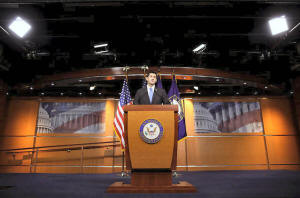|
Top Republican Ryan distances himself
from Trump White House bid
 Send a link to a friend
Send a link to a friend
 [October 11, 2016]
By Richard Cowan and Susan Cornwell [October 11, 2016]
By Richard Cowan and Susan Cornwell
WASHINGTON (Reuters) - Paul Ryan, the top
Republican in the U.S. Congress, took the extraordinary step on Monday
of distancing himself from Donald Trump, stirring a backlash from some
lawmakers and deepening a crisis over his party's struggling
presidential nominee.
In a conference call with congressional Republicans, Ryan all but
conceded that Democrat Hillary Clinton was likely to win the White House
on Nov. 8 and said he would put his full energy into preserving
Republican majorities in Congress so as not to give her a "blank check."
Ryan, the speaker of the House of Representatives, said he would not
defend Trump or campaign for him after the uproar over the New York
businessman's sexually aggressive comments that surfaced on Friday.
Ryan's announcement added to the party's worst turmoil in decades and
reinforced the growing sense of isolation around Trump, who has never
previously run for public office.
Clinton has led Trump in most national opinion polls for months and
Trump's poll numbers have begun to drop further since the emergence on
Friday of a video from 2005 showing the former reality TV star bragging
crudely about groping women and making unwanted sexual advances.

Trump hit back at Ryan, the Republican vice presidential candidate in
2012, who has frequently been critical of him.
"Paul Ryan should spend more time on balancing the budget, jobs and
illegal immigration and not waste his time on fighting Republican
nominee," Trump wrote on Twitter.
Ryan, who had expressed disgust over the tape and canceled a campaign
event with Trump over the weekend, did not completely cut ties to Trump.
The speaker went back on the Republican conference call later to clarify
he was not withdrawing his endorsement.
Many Republican members of Congress are concerned that Trump's chaotic
campaign could ruin their chances of holding their majorities in the
House of Representatives and Senate in the November election and could
inflict long-term damage on the party.
During a weekend dominated by criticism of Trump over the lewd remarks,
a string of members of Congress, governors and other prominent
Republicans called on him to drop out of the race.
House Republicans gave Ryan a rough ride on the call, according to some
participants.
"There was an undeniable opposition to the speaker's tepid support of
our nominee,Ē said U.S. Representative Scott DesJarlais, a Trump
supporter, in a comment passed on by an aide.
Many other lawmakers, some of whom did not want to be named publicly
criticizing the speaker, said members frequently told Ryan on the call
to stand by Trump.
Nonetheless, nearly half of all 331 incumbent Republican senators,
Congress members and governors have condemned Trumpís remarks, and
roughly one in 10 has called on him to drop out of the race, according
to a Reuters review of official statements and local news coverage.

Republican National Committee Chairman Reince Priebus used an afternoon
conference call with RNC members to emphasize there was no rift with
Trump and that the committee, the party's leadership and fundraising
arm, still backed the nominee, two RNC members who spoke on condition of
anonymity said.
RNC STILL ON BOARD
"Any suggestion that the RNC isnít fully supporting the Trump-Pence
ticket is wrong," one RNC member said, describing the message. "We are
fully on board. We are going to devote every ounce of effort and
resource into helping the Trump-Pence ticket win and all the other
candidates up and down the ballot."
[to top of second column] |

Speaker of the House Paul Ryan (R-WI) holds a news conference on
Capitol Hill in Washington, DC, U.S. September 29, 2016.
REUTERS/Gary Cameron

Any attempt to replace Trump on the ballot this close to Election
Day would face huge legal and logistical hurdles.
A defiant Trump went on the offensive in a vicious presidential
debate on Sunday, saying Clinton, a former secretary of state would
go to jail if he were president and attacking her husband, former
President Bill Clinton, for his treatment of women.
The debate, the second of three before the vote, was remarkable for
the brutal nature of the exchanges between the two.
Trump stayed on the attack on Monday, describing Bill Clinton as "a
predator" and saying: "If they want to release more tapes saying
inappropriate things, weíll continue to talk about Bill and Hillary
Clinton doing inappropriate things. There are so many of them."
"She goes out and says: 'I love women, Iím going to help women.'
Sheís a total hypocrite," he told supporters in Ambridge,
Pennsylvania.
Clinton accused Trump of brushing off criticism of his comments
about women.
"On Friday, the whole world heard him talking about the terrible way
he treats women. And last night when he was pressed about how he
behaves, he just doubled down on his excuse that itís just locker
room banter," she told a rally at Wayne State University in Detroit.
The television audience for the debate fell sharply from their
first, record-breaking encounter in September.
Nielsen data supplied by CNN for 10 broadcast and cable channels on
Monday showed that 63.6 million Americans tuned into the 90-minute
debate on Sunday, well below the record 84 million that watched the
first face-off.

An NBC News/Wall Street Journal opinion poll released on Monday
showed Clinton increasing her lead. The survey, conducted after the
video release but before the debate, showed Clinton with 46 percent
support among likely voters in a four-way matchup including two
minor party candidates, compared with 35 percent for Trump.
The Reuters/Ipsos State of the Nation project released on Monday
estimated that Clinton had at least a 95 percent chance of winning
the 270 Electoral College votes needed to become president. The
polling did not capture reaction to Trump's performance in Sunday's
debate or the release of the Friday videotape.
(Additional reporting by Susan Cornwell, David Morgan, Michelle
Conlin, Amanda Becker, Andy Sullivan and Susan Heavey; Writing by
Alistair Bell and John Whitesides; Editing by Frances Kerry and
Peter Cooney)
[© 2016 Thomson Reuters. All rights
reserved.]
Copyright 2016 Reuters. All rights reserved. This material may not be published,
broadcast, rewritten or redistributed.
 |